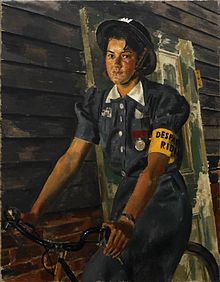Alfred Thomson
Alfred Reginald Thomson | |
|---|---|
| Born | Alfred Reginald Thomson 10 December 1894 Bangalore, India |
| Died | 27 October 1979 (aged 84) Chelsea, London |
| Nationality | British |
| Education | London Art School |
| Known for | Painting, poster design |
| Olympic medal record | ||
|---|---|---|
| Art competitions | ||
| 1948 London | Painting | |
Alfred Reginald Thomson RA (10 December 1894 – 27 October 1979) was an English artist and Olympic Gold Medalist, most notable for being an official War Artist to the Royal Air Force during World War Two.
Life

Thomson was born in Bangalore in India where his father George was a British civil servant who had married an Irish woman, Florence Green.[1][2] Thomson was deaf from birth and when the family returned to Britain from India he attended the Royal School for Deaf Children at Margate.[3] While at the school, he learnt sign language.[1] By the time he was 13, he was already six feet tall.[1] His father was unhappy that he had not learnt to speak terribly well, and transferred him to a small private oral school run by a Mr Barber at Brondesbury.[1] Later in life he was known, in the press, as the "deaf and dumb" artist.[4]
Although Thomson attended the London Art School in Kensington for a time, under C.M.Q. Orchardson, a son of William Quiller Orchardson, and was tutored by John Hassall, he failed to pass the exam for entry into the Royal Academy School, and his father sent him to work on a farm in Lenham, Kent, and forbade him from doing any art.[1] He left the farm, finding his first paid work designing posters at Vitagraph, in Long Acre, for a whisky company.[1] He also created a series of posters for Daimler Cars.[2]
At the end of the First World War Thomson established himself as a commercial artist and figure painter.[2] In the 1930s he created a series of murals for the Duncannon Hotel in London.[2] Thomson also had a talent as a caricaturist and he drew his fellow artists and friends.[2]
Thomson completed a number of commissions for the War Artists' Advisory Committee during World War Two and in September 1942 became a full-time salaried artist attached to the Air Ministry, taking over the post that Eric Kennington had resigned from. Thomson painted several portraits of RAF air crews and also medical and civil defence subjects.[5][6]
In 1945 Thomson was elected to the Royal Academy and soon became a highly respected society portrait painter.[7] He also continued to paint murals, most notably for the Science Museum and the London Dental School.[3] In the 1948 Olympic Games in London, Thomson became the last person to win a Gold Medal for painting as medals for art were abandoned in subsequent Olympic games.[8]
References
- ^ a b c d e f Dimmock, A F (1991). Tommy: A biography of the Distinguished Deaf Royal Painter A.R. Thomson. Scottish Workshop Publications. ISBN 1873577109.
- ^ a b c d e "Mr A.R. Thomson". Obituaries. The Times. No. 60482. London. 23 November 1979. col G, p. 14. template uses deprecated parameter(s) (help)
- ^ a b "Artist: Alfred Thomson". room4art. Archived from the original on 2 February 2008. Retrieved 10 February 2015.
- ^ "Alfred Thomson RA (1894-1979)". Archived from the original on 3 July 2009.
- ^ Imperial War Museum. "War artists archive;- A.R. Thomson". Imperial War Museum. Retrieved 10 February 2015.
- ^ Brian Foss (2007). War paint: Art, War, State and Identity in Britain, 1939-1945. Yale University Press. ISBN 978-0-300-10890-3.
- ^ "Alfred Thomson R.A". Royal Academy. Retrieved 4 September 2016.
- ^ *"The Official Report of the Organising Committee for the XIV Olympiad London 1948" (PDF). London: The Organising Committee for the XIV Olympiad. 1951: 535–537. Archived from the original (PDF) on 27 July 2011. Retrieved 7 March 2012.
{{cite journal}}: Cite journal requires|journal=(help)
External links
- 49 artworks by or after Alfred Thomson at the Art UK site
- 1894 births
- 1979 deaths
- 20th-century English painters
- English male painters
- Artists from Bangalore
- British war artists
- Deaf artists
- English Olympic medallists
- Olympic gold medalists in art competitions
- Olympic gold medallists for Great Britain
- Royal Academicians
- World War II artists
- Painters from Karnataka
- Deaf people from England
